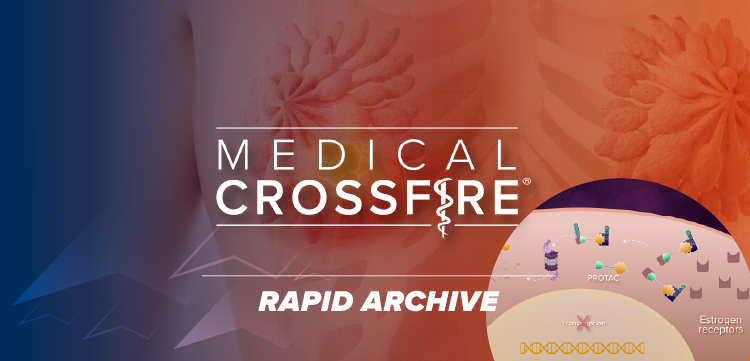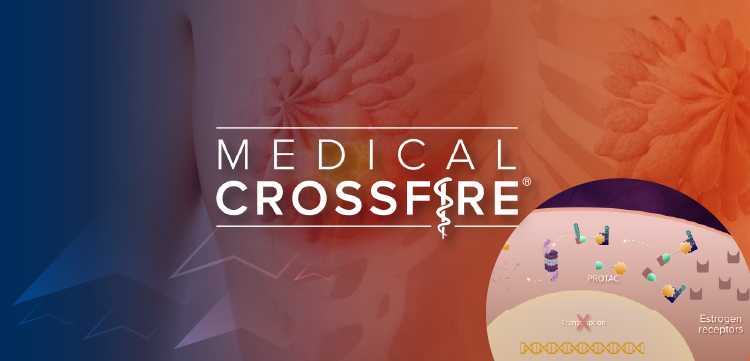
Ripretinib Shows Survival Benefit in Patients With GIST Who Crossed Over After Progression in Phase 3 Study
“The data presented today further reinforce the potential of ripretinib to provide meaningful clinical benefit to patients with advanced gastrointestinal stromal tumor."
Ripretinib (Qinlock) in the fourth-line setting or further induced clinically meaningful benefit in terms of progression-free survival (PFS) and overall survival (OS) among patients with gastrointestinal stromal tumor (GIST) who had progressed previously on placebo in the pivotal phase 3 INVICTUS trial.1
The median PFS for patients who had crossed over to the open-label extension to receive ripretinib was 4.6 months (95% CI, 1.8-not evaluable [NE]), and the median OS was 11.6 months (95% CI, 4.1-NE).
In comparison, the double-blind period of the study showed a median PFS with ripretinib was 6.3 months (95% CI, 4.6-6.9) versus 1.0 months with placebo (95% CI, 0.9-1.7). The median OS for ripretinib was 15.1 months (94% CI, 12.3-15.1) versus 6.6 months with placebo (95% CI, 4.1-11.6).
“The data presented today further reinforce the potential of ripretinib to provide meaningful clinical benefit to patients with advanced GIST,” said César Serrano, MD, PhD, head of the Sarcoma Translational Research Group at the Vall d'Hebron Institute of Oncology, in a statement. “Ripretinib represents a new standard of care for patients with GIST who have received 3 prior treatments.”
Two patients from the cross over analysis had partial responses, which were observed as early as 1 month following therapy initiation. The treatment appeared well-tolerated, and the toxicities were consistent with what has been observed in prior data from the INVICTUS trial.2
According to the data presented at the 2020 Virtual World Congress on Gastrointestinal Cancer for the group of patients from the placebo arm who crossed over to receive ripretinib, there were 13 PFS events (45%) and 16 censored (55%), compared with 51 (60%) and 34 (40%) with ripretinib in the double-blind period versus 37 (84%) and 7 (16%) in the placebo arm, respectively.
There were no new safety signals observed, and grade 3/4 adverse events in the crossover arm included anemia in 6 patients (21%), fatigue in 2 patients (10%), abdominal pain in 2 patients (6.9%), and constipation in 1 patient (3.4%). During the double-blind period, the grade 3/4 adverse events included anemia in 8 patients (9.4%), abdominal pain in 6 patients (7.1%), fatigue in 3 patients (3.5%), and myalgia, constipation, and decreased appetite in 1 patient each (1.2% each).
In this study, patients were randomized 2:1 to receive either ripretinib or placebo. The purpose of the double-blind, placebo-controlled, international, multicenter study was to evaluate the safety, tolerability, and efficacy of the agent in patients with advanced GIST who have previously received at least imatinib (Gleevec), sunitinib (Sutent), and regorafenib (Stivarga).1
Patients were eligible to cross over to receive ripretinib after disease progression on placebo. Ripretinib was given in a 150 mg once daily dose. Of 44 patients randomized to placebo, 29 crossed over to receive the study drug.
Ripretinib recently received
Enrollment for the phase 3 INTRIGUE clinical trial (NCT03673501) is now ongoing, which will further evaluate ripretinib compared with sunitinib in patients with advanced GIST after treatment with imatinib.
“On the heels of ripretinib’s recent approval in the U.S. and Canada in patients with fourth-line GIST, we are excited to add to the body of evidence supporting its potential as a new standard of care in this setting,” stated Matthew L. Sherman, MD, executive vice president and chief medical officer of Deciphera. “GIST is a highly complex disease for which we specifically designed ripretinib and we are committed to ensuring it is able to reach as many appropriate patients as possible.”
References
- Deciphera Announces Presentation of Analysis of Crossover Population from the INVICTUS Phase 3 Study of QINLOCK™ (ripretinib) in Patients with Fourth-Line Advanced GIST. News Release. Deciphera; July 2, 2020. Accessed July 6, 2020. https://bit.ly/2AyxDoT
- Serrano C, Heinrich M, George S, et al. Efficacy and safety of ripretinib as ≥4th-line therapy for patients with gastrointestinal stromal tumor (GIST) following crossover from placebo: Analyses from INVICTUS. Presented at: 2020 Virtual World Congress on Gastrointestinal Cancer; July 1-4, 2020.















































